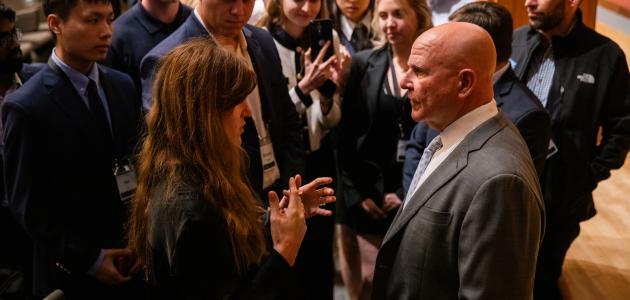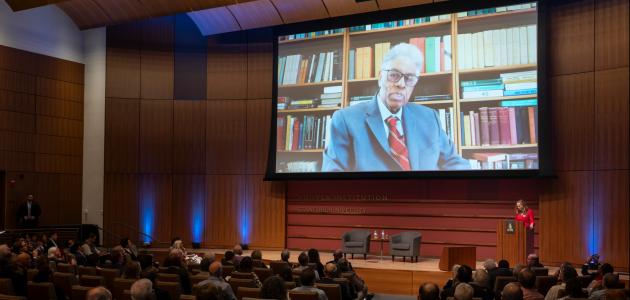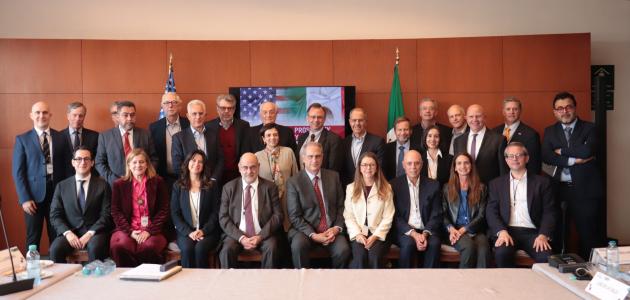A weekly digest of the latest news and research related to the work of the Technology, Economics, and Governance Working Group. Topics covered in the digest include cybersecurity, domestic regulation, innovation, international competition, social media disinformation, and the California exodus.
In this week’s edition, the EU pivots to LNG as a replacement for Russian oil, Starlink builds communications resilience in Ukraine, Microsoft supports workers’ rights to unionize, and federal circuit courts are divided on social media legislation centering on freedom of speech. In addition, venture capital firms continue to raise large crypto funds, Virginia Tech researchers explore quantum network architecture, and the Space Force defines cybersecurity standards for commercial satellite vendors.
Industrial Policy & International Security
Elon Musk’s fledgling Starlink satellite network has become a lifeline in Ukraine | Fortune
Ukrainian users of Starlink’s satellite internet network make up more than half of the business’s customers, and they are getting service for free. Elon Musk was easily convinced to help Ukraine after receiving a plea from digital transformation minister Mykhailo Fedorov on Twitter. Since late February, Starlink has turned on satellites over Ukraine and provided 11,000 portable receivers to users on and off the battlefield. The receivers not only provide communications resilience to soldiers on the front lines but also support civilians in areas where Russian attacks have damaged infrastructure. Starlink has been essential to healthcare workers and, in one case, a thermal power plant. Russian forces have not yet been able to jam Starlink communications. The experience in Ukraine is expected to accelerate Starlink’s plans to grow their business.
How Europe plans to cope as Russia cuts off the gas | The Economist
This week, the EU partially banned Russian oil and Europe is turning to liquefied natural gas (LNG) imported from America and Asia as a new source of fuel. From March to April, LNG imports increased by almost 20% and, compared to April 2021, imports are up by 47%. However, replacing Russian gas with LNG is complicated by Europe’s limited processing facilities and pipelines. Germany, which has no LNG terminals, is taking steps to authorize the rapid construction of onshore terminals and lease floating storage and regasification units. Other European countries are pursuing similar strategies to expand their capacity to import and sell LNG. Environmentalists lament the increased spending on fossil fuels.
US Regulation
Microsoft tries collaborating with unions to avoid ‘public disputes’ | The Washington Post
Microsoft’s acquisition of Activision Blizzard is putting the company in the spotlight for its position on workers’ rights. In March, employees of a subsidiary of Activision voted to unionize and regulators are paying close attention to whether or not the acquisition will impact unionization. This week, Microsoft President Brad Smith voiced support for workers’ right to unionize if they so choose, and wrote that the company aims to make that process “simpler rather than more difficult.” This stance distances Microsoft from other Big Tech companies that have clashed with the National Labor Relations Board for their opposition to unions. Under Brad Smith’s leadership, Microsoft has maintained a constructive relationship with federal regulators and has avoided getting caught up in the more contentious tech regulatory battles.
Tech Innovation
Binance Labs closes $500M fund to focus on web3 and blockchain adoption | TechCrunch
Declining cryptocurrency values aren’t scaring investors away. Binance Labs, which is the venture capital arm of a crypto exchange, recently closed a $500 million investment fund that executive director of investments and M&A Ken Li says is “to help advance adoption of web3 technologies, across all stages.” Investment in the crypto and blockchain ecosystem in 2022 to date has already outpaced last year’s funding levels, reaching $15 billion in total capital raised. Andreessen Horowitz closed its latest crypto fund at $4.5 billion in May and other firms, including Old Fashion Research, are also raising multimillion dollar funds in this space.
Cyber
Space Force finally rolls out cyber standards for commercial SATCOM providers | Air Force Magazine
The Commercial Satellite Communications Office (CSCO) is setting cybersecurity standards for commercial satellite vendors through its new Infrastructure Asset Pre-Assessment (IA-Pre) program. IA-Pre allows vendors to pre-qualify their products for the Approved Platforms List (APL) through a third party cybersecurity assessment and monthly follow-up reporting. CSCO’s Best Value Tradeoff contracting standard allows them to select higher priced bids for award if the vendor offers a better value for the government. The prospect of winning government contracts at higher prices could incentivize commercial satellite companies to seek out IA-Pre assessments so their products appear on the APL. IA-Pre has been in development since 2018 and was motivated by concerns that commercial satellite networks will become military targets.
Commonwealth Cyber Initiative researchers at Virginia Tech explore how quantum networks could transform cybersecurity | Virginia Tech
Researchers at Virginia Tech are exploring whether quantum entanglement–the phenomenon that links qubits together even after they are physically separated–can serve as the foundation for future quantum networks. A network based on entanglement would allow users to send information between nodes through a series of waystations built on entangled qubits. Quantum networks and information processing are inherently more secure than traditional data transmission because the quantum state of qubits are modified by the act of measuring or copying them, giving away any attempts at interception or meddling. Quantum networks are possible in principle, and the team at Virginia Tech hope to solve the technical and engineering challenges to develop a scalable network architecture.
State & Local Tech Ecosystems
Origin Investments ranked Phoenix, AZ; Tucson, AZ; Las Vegas, NV; Austin, TX; and Nashville, TN as top US cities offering the greatest real estate growth potential. Income, employment, population growth, and housing market data contributed to the rankings. The Origin report pointed to each city’s connection to the tech industry and “strong university presences” as contributing factors fueling robust job markets and migration from coastal cities. However, real estate markets in areas dominated by tech workers can be more vulnerable to economic downturns.
Democracy Online
Want to regulate social media? The First Amendment may stand in the way | The Washington Post
Across the country, Republicans are sponsoring state-level legislation targeting tech companies’ ability to moderate content on their platforms in a move to protect free speech. They believe that conservative speech is unfairly censored on online platforms compared to liberal speech. The legal battles over this issue run against widespread efforts to hold companies accountable for content that delivers misinformation or amplifies harmful speech. Furthermore, federal appeals court decisions on Texas and Florida laws are split on the issue of whose right to free speech is at risk. Notably, the 11th Circuit opinion qualified content curation as constitutionally protected speech and determined that Florida’s social media law infringed on companies’ rights.
Connecticut will pay a security analyst $150k to monitor election memes for misinformation | Popular Science
Governor Ned Lamont’s budget includes more than $6 million dollars in provisions to improve and secure Connecticut’s election system. Ahead of the midterm elections, some of that money will be spent on hiring a security analyst to identify misinformation online and give the state more time to counter false narratives. Connecticut is not the only state implementing strategies to minimize the harmful effects of misinformation: Colorado, Arizona, California, Idaho, and Oregon have also funded programs to ensure the integrity of their elections.














